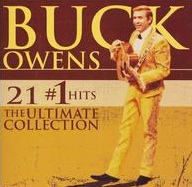Music Library: Otis Rush, Otis Taylor, OutKast, Overkill L.A., Owen Pallett, Buck Owens, Ozzy Osbourne
Otis Rush – “Double Trouble” (1958). Excellent and ominous blues.
Otis Taylor – White African (2001). Bluegrassy folk blues that has quite a bit of heart for blues made in the double-oughts.
Outkast – Southernplayalisticadillacmuzik (1994), ATLiens (1996), Aquemini (1998), Stankonia (2000), Speakerboxxx/The Love Below (2003). The progression from chicken-fried funk to psychedelia to the unbridled pop of the 2003 double album makes for a great afternoon of listening. What happened to these guys?
Overkill L.A. – Triumph of the Will (1985). SST put out some excellent metal with St. Vitus, but this is just turgid and dull.
Owen Pallett – Lewis Takes Off His Shirt EP (2010). Since retiring the Final Fantasy name, Pallett has put out an album that I hear is pretty great, but sadly, I have yet to pick it up. This EP, which mostly consists of remixes of the title cut, is only so-so.
Buck Owens – 21 #1 Hits: The Ultimate Collection (1963-1988). I picked up this at a bargain-basement price after I covered Owens a million years ago. This has most of his hits from the 60s in their original form, but substitutes a 1988 duet with Dwight Yoakam for the original “Streets of Bakersfield,” an astonishingly short-sighted attempt to rope in new fans who would be in their 40s or 50s now.
Ozzy Osbourne – Blizzard Of Ozz (1980) and Diary Of A Madman (1981). I’m awfully fond of these albums, although they are nothing but buttery cheese. I love Sabbath’s doom and gloom, but Ozzy on his own is not that far from David Lee Roth’s sense of schmaltz and showmanship.
And that's it for the Os. More coming soon.












.jpg)











